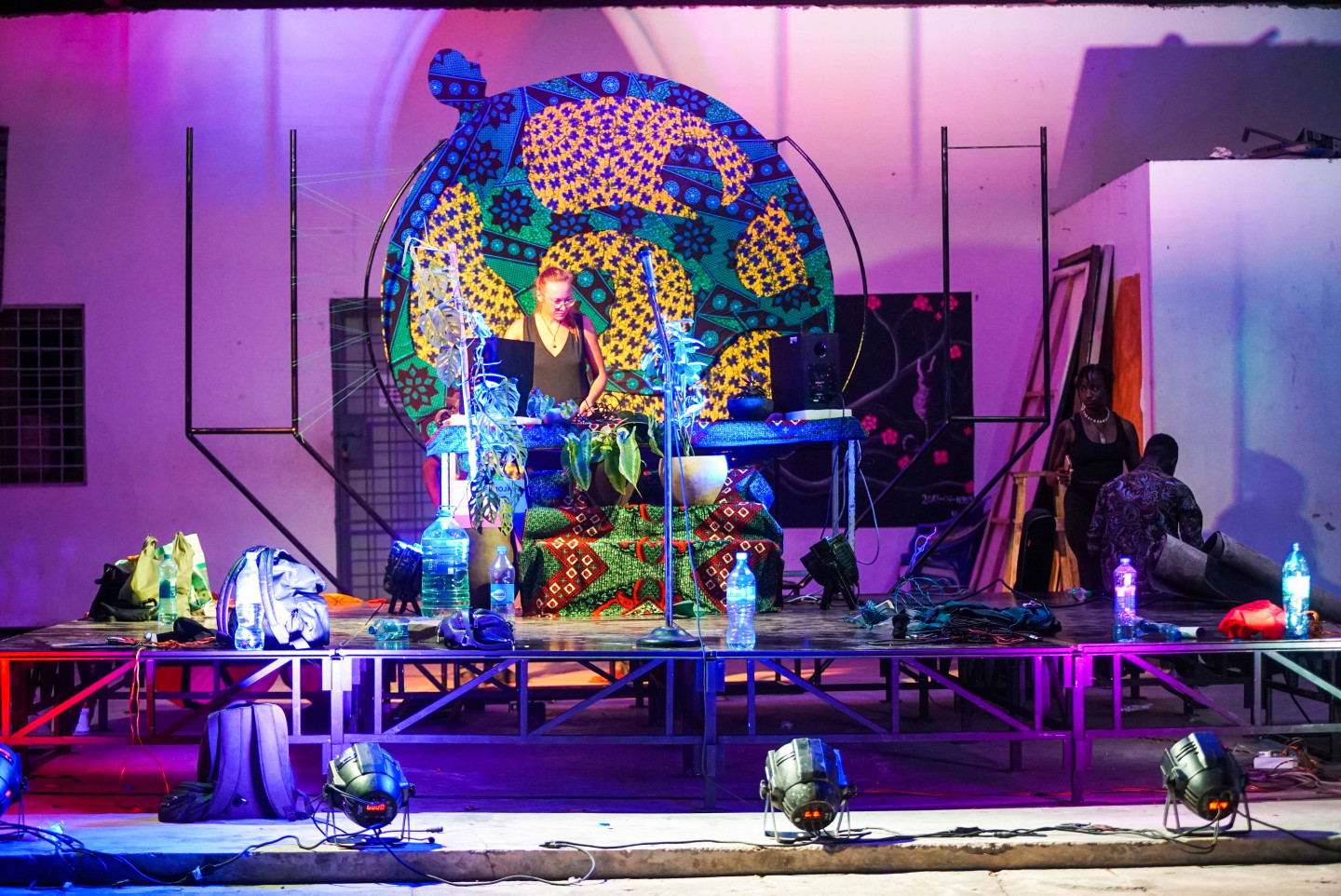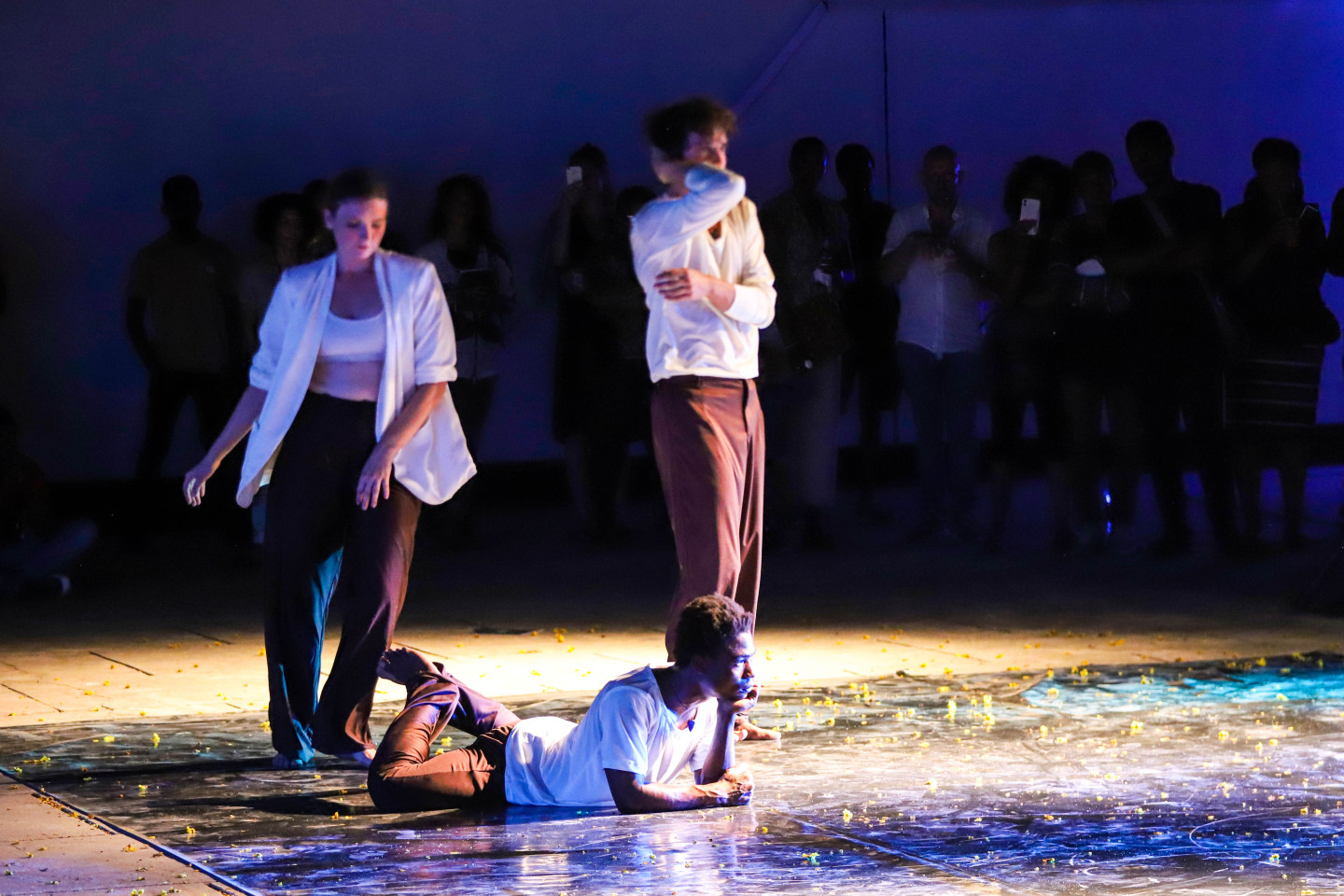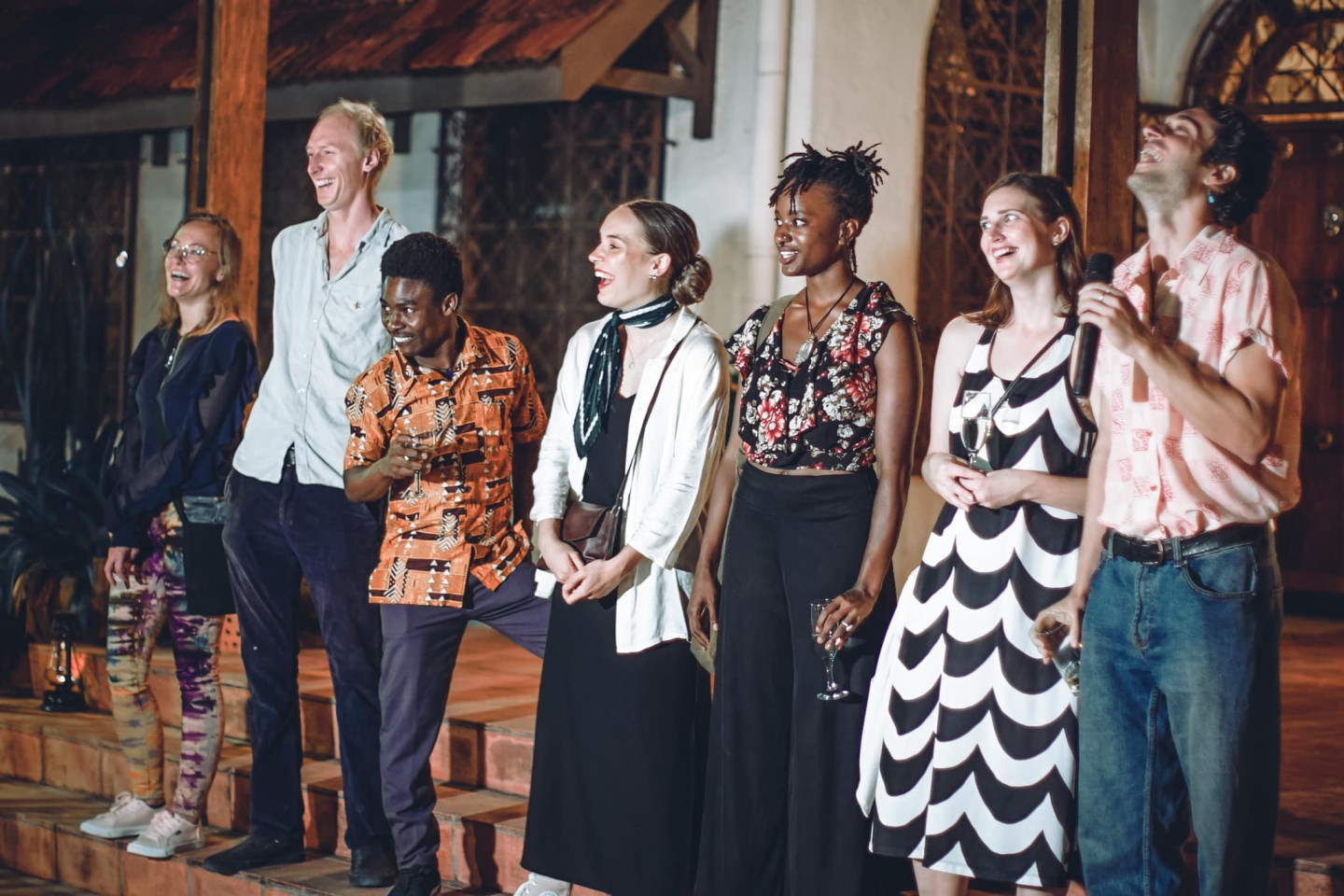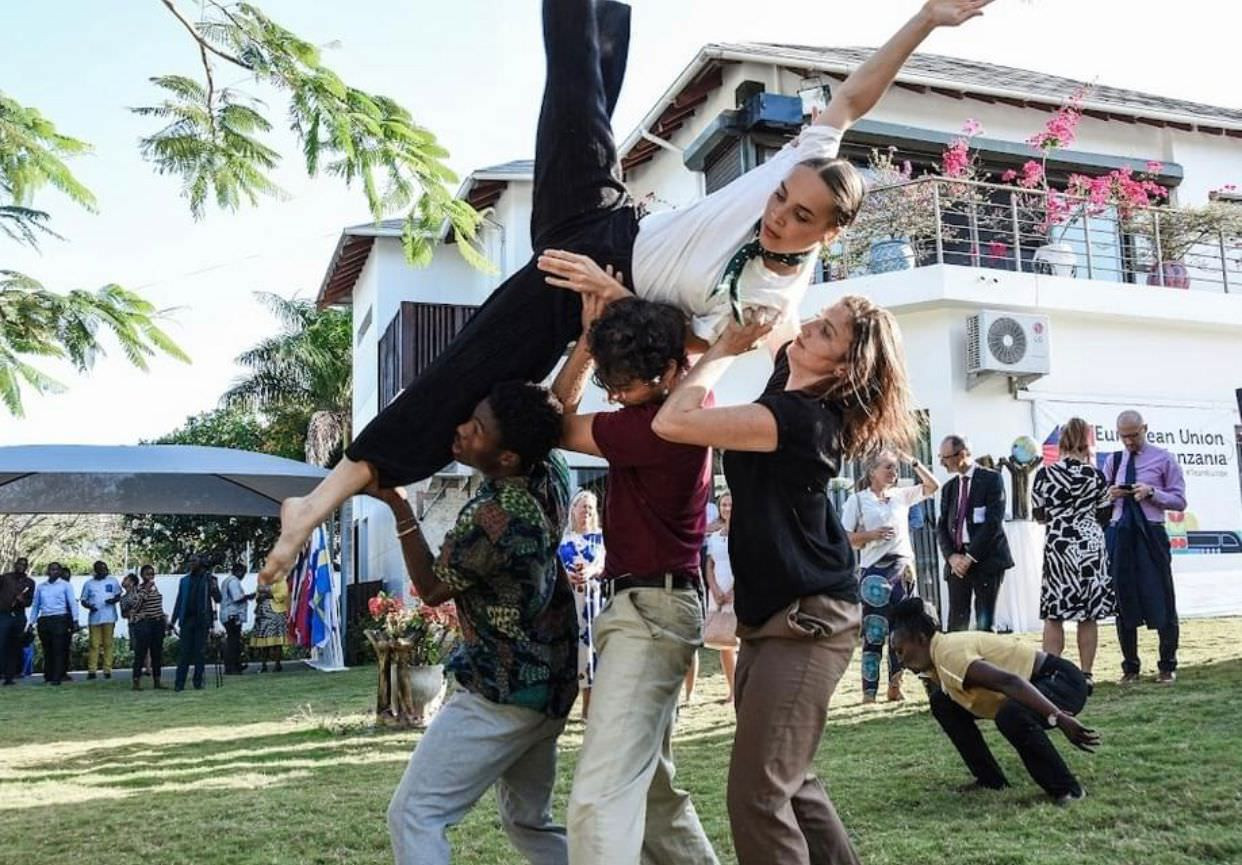



A spirit of equal collaboration and dialogue in Tanzania
On 12 November, the UMOJA residency, one of European Spaces of Culture’s pilot projects in 2022, concluded with the UMOJA Finale at the University of Dar Es Salaam in Tanzania. The residency and the presentation were the result of an innovative and systematic approach to collaboration.




Dar es Salaam, with over 6 million inhabitants, is one of the fastest growing cities in Africa, yet there is poor cultural infrastructure and education on contemporary art, thus depriving artists from accessing their local audience and audiences from enjoying art. Moreover, while personal links with artists in neighbouring East African countries exist, a structure does not exist to turn these into long-standing collaborations.
The UMOJA project team identified a number of urgent needs from an early assessment, with the first being that artists need access to markets and international exposure. Another challenging factor for Tanzanian artists to thrive is the lack of cultural infrastructure, impeding artists to reach audiences and vice versa. Moreover, women only represent 25% of the artists and facing a severe lack of recognition. UMOJA marked the first time that in Tanzania, a wide collaboration of European and Tanzanian stakeholders joined forces to address these needs together.
Promoting gender balance and social cohesion through the arts
European Spaces of Culture’s UMOJA project strengthened the bonds between contemporary and urban artists from Tanzania, East Africa and the EU in the fields of dance, music and visual art via a gender-balanced residency. The project promoted artistic cooperation, quality education, private-public partnerships, network development, and connection to global markets. Moreover, the project opened doors for Dar es Salaam to new types and forms of contemporary art that have little space in cultural programming. Rachel Kessi, founder of Muda Africa, one of the key local partners: “It’s an opportunity for audiences to connect to different types of art we don’t usually see in Dar es Salaam, or anywhere else in Tanzania.”
It’s an opportunity for audiences to connect to different types of art we don’t usually see in Dar es Salaam, or anywhere else in Tanzania.
Rachel Kessi, Founder of Muda Africa"
The project was, and remains to be, coordinated by a pioneering network of Tanzanian and European cultural institutes, academia and government bodies and managed by a project management team, made of artists from the Dar es Salaam cultural scene.
UMOJA residency
UMOJA united four East African and five European artists in a five-week long, gender-balanced, multi-disciplinary residency with workshops and fringe events to further promote local urban and contemporary art. Two musicians, fivedancers and two visual artists were brought together, with local artists and partners, to collaborate and find new ways of understanding to create and innovate as one. They independently explored the capital, from the local markets to local beaches to the outskirts of Dar es Salaam. They also created original works conceptually rooted in their experiences there – from an audio exploration with local plants to large sculptures exploring life journeys to collaborative, metaphoric dance pieces.
The goal for me is collaboration and more exposure to the arts scene in Dar es Salaam and experience different forms of collaboration and diversity.
Alphie Emmanuel, UMOJA residency artist
The residency programme intended to open a cultural dialogue between East African and European artists, as well as to promote gender balance and social cohesion through dance, music and visual arts. The original works produced during the residency were showcased at the University of Dar es Salaam College of Arts and Social Science, bringing together the artists and local communities. The five dancers together created and performed the 45-minute collective dance piece Kiganja (Palm), a movementpbased story about acceptance tigetherness, and support. The residency programme have forged partnership not only between the residency artists, but also with the local artists they engaged in. UMOJA aims to continue and grow and to remain a unique meeting space for artists from Tanzania, East Africa and Europe.
A spirit of dialogue and collaboration
A key element of the UMOJA project has been the strong collaborative spirit that has been evident from inception to implementation. The initiative provoked the EUNIC cluster in Tanzania to get closer to one another guided by the principles of cultural relations. All partners – Tanzanian and European – took an equal seat at the table and took decisions on all facets of the project collectively, be it the visual design, the curation or the location of events. Because of this collective spirit towards a common goal, the project managed to move away from showcasing a collection of national cultures to actual co-creation, which then was not only reflected by the residency.
The different partners found their complementarities in an organic way and distributed responsibilities, but for every decision returned to the collective table. This complementarity was highlighted by Chi Temu, one of the three-headed project management team of UMOJA: “UMOJA means being able to work cohesively with people who, not necessarily, have the same background as you, but somehow being able to work together to create one thing that really showcases everyone’s singular beauty but also showcases what beauty looks like whenever it comes together.”
UMOJA means being able to work cohesively with people who, not necessarily, have the same background as you, but somehow being able to work together to create one thing that really showcases everyone’s singular beauty but also showcases what beauty looks like whenever it comes together.
Chi Temu, UMOJA project management team
The EU Delegation took an important coordinating role in the project. The EUD, regularly quite active in supporting the Tanzanian cultural scene already, was able to add value by bringing (new) organisations together, create opportunities to reflect and to offer visibility. EU Ambassador to Tanzania Manfredo Fanti, speaking at the recent EUNIC General Assembly on 9 December, reflected on what it meant for the EU Delegation’s to be part of the project: “We are proud of the project, which has been something new for Tanzania. That has shown how nice it is to bring young talented people to work together and who have established a durable relationship”.
Ambassador Fanti also underlined the added value of the collaborative model presented by European Spaces of Culture: “The key word is listening to local partners. Traditionally, the European partners have been working to make their national or European culture known. But we have changed our model – there is above all a willingness to create a meeting of culture, co-creation and collaboration and support to local artists. This is an important role that the EU, as Team Europe, can play.”
The key word is listening to local partners. Traditionally, the European partners have been working to make their national or European culture known. But we have changed our model – there is above all a willingness to create a meeting of culture, co-creation and collaboration and support to local artists. This is an important role that the EU, as Team Europe, can play.
Manfredo Fanti, EU Ambassador to Tanzania
